
What appears to be a story of mothers and daughters, of sisterhood put to the test, of adolescent love and grown-up misconduct, and of history’s long reach, becomes a provocative and compelling exploration of America’s failure to find a language to talk about race. The power of this shattering novel resides in Greenidge’s undeniable storytelling talents.

But when Charlotte discovers the truth about the institute’s history of questionable studies, the secrets of the past invade the present in devious ways. The Freemans were selected because they know sign language they are supposed to teach it to Charlie and welcome him as a member of their family. They will live in an apartment on campus with Charlie, a young chimp abandoned by his mother. The Freeman family-Charles, Laurel, and their daughters, teenage Charlotte and nine-year-old Callie-have been invited to the Toneybee Institute to participate in a research experiment. A rich examination of America’s treatment of race, and the ways we attempt to discuss and confront it today.” - The Huffington Post “A terrifically auspicious debut.” -Janet Maslin, The New York Times So at the end of the novel, when she makes her final decision, I know she didn’t turn back.A FINALIST FOR THE 2016 CENTER FOR FICTION FIRST NOVEL PRIZE AND THE 2017 YOUNG LIONS AWARD Libertie didn’t know what freedom was, but she knew she deserved more than what was given her.

The beauty of this novel is in that realization.

She’s someone I saw myself in, and like most historical novels written about Black women, thanked God I would never be. When mourning the loss of another character, Libertie adjusts her perspective: “Care, I decided, was monstrous.” Although she never shares that realization with another character, I doubt a single reader would disagree.Īt times, I could predict how she would react because I felt I knew her so well. She keeps so much of the way she thinks hidden from other characters (for a myriad of reasons), that it’s an intimate joy to get a glimpse into her logical, sympathetic mind. The words are plain and then she asks, “Was freedom worth it if you still ached like that? If you were still bound to this earth by desire?” I had to pause, reading once, twice again, before pouring back into the book.īecause the book is written in the first person, readers are allowed to get intimate with Libertie’s thoughts. Libertie’s most intimate moments happen when she’s alone, lost in thought.

“Libertie’' is an easy page turner - its simple prose makes the plot digestible and the lyrical sentences sing louder.


 0 kommentar(er)
0 kommentar(er)
